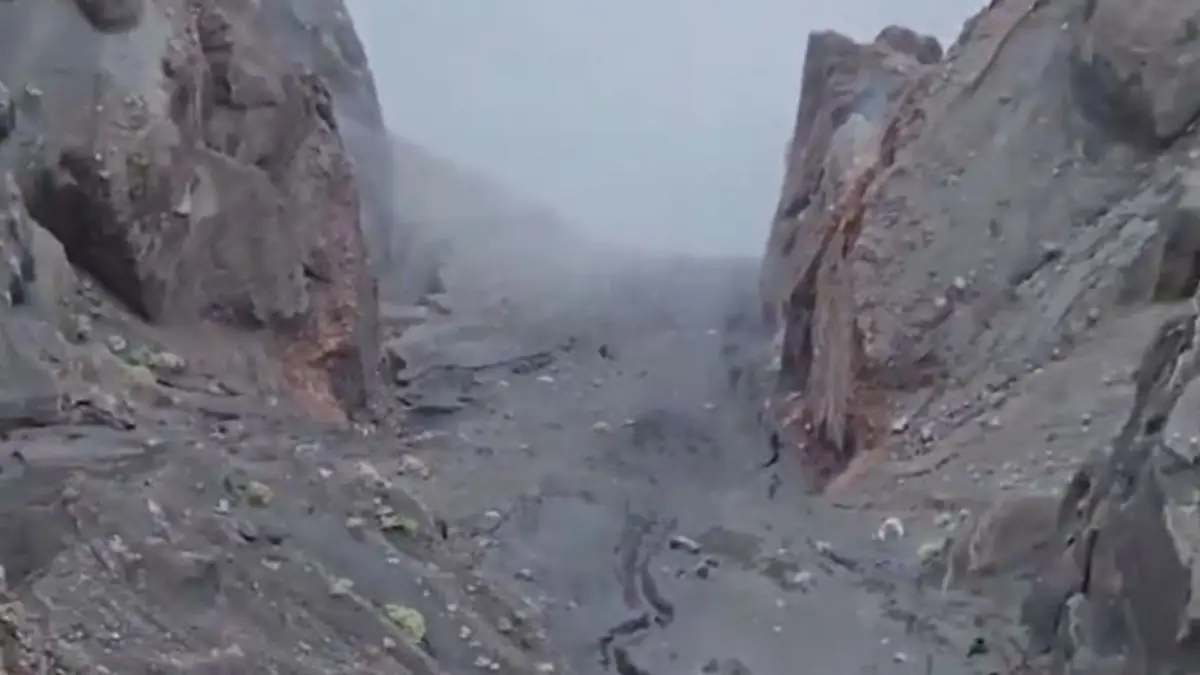Brazilian tourist found dead after falling into ravine at Mount Rinjani, Indonesia
Brazilian tourist Juliana Marins, 26, was found dead in a steep ravine at Mount Rinjani, Lombok, Indonesia, on June 24, 2025. Marins fell into the ravine at approximately 06:30 local time (LT) on June 21, 2025, during a hike on the slopes of the active stratovolcano.

Image credit: GDH
A 26-year-old tourist from Brazil was confirmed dead on June 24, three days after falling into a steep ravine inside the crater walls of Mount Rinjani, an active stratovolcano on the Indonesian island of Lombok.
The fall occurred around 06:30 LT on June 21, near the trail between Cemara Nunggal and Segara Anak crater lake. Marins slipped from a narrow segment of the path and fell 500 m (1 640 feet) into the volcano’s inner wall, landing on a ledge within the crater structure.
Search and rescue operations began the same day, with drone teams detecting cries for help and visual contact from June 21 to June 23. Food and water were supplied to her via drone. Officials stated that the terrain, a combination of overhanging cliffs, unstable volcanic sand, and vertical drop-offs, prevented rope anchoring and ground access. Helicopter assistance was not possible due to persistent fog, wind, and low visibility.
Endonezya’daki Rinjani Yanardağı’nda 300 metre yükseklikteki patikadan düşen Brezilyalı bir kadın, saatlerdir bulunduğu noktada yardım bekliyor.pic.twitter.com/ALLVTOkxG8
— Onedio (@onediocom) June 24, 2025
Endonezya'da aktif yanardağ Mount Rinjani’de yürüyüş yaparken uçurumdan düşen Brezilyalı turist Juliana Marins, günlerdir hayatta kalma mücadelesi veriyor.
— gdh (@gundemedairhs) June 24, 2025
Ulaşılması zor bölgedeki genç kız yalnızca drone ile görüntülenebiliyor. pic.twitter.com/AvXNDuNOly
Two experienced mountaineers joined the operation on June 23, bringing specialized rope systems to assist ground teams. However, by June 24, thermal drone imaging showed the individual lying motionless at the same site.
According to Mohammad Syafii, head of Indonesia’s National Search and Rescue Agency (BASARNAS), a rescuer reached the victim at a depth of 600 m (1 970 feet) on June 24 and found no signs of life. “Three rescuers got closer to the victim and confirmed she has died,” Syafii told reporters. He added that the body would be evacuated on June 25 due to continued poor weather conditions.
BASARNAS coordinated the recovery with support from local rescue teams and the Brazilian embassy in Jakarta. The body was recovered under challenging conditions and transported from the crater. The Mount Rinjani trail was closed temporarily during the operation.
A primeira coisa que um ignorante faz quando está com raiva é procurar alguém pra botar a culpa. Primeiro que o resgate dela era praticamente impossível, ela não ficou 4 dias num lugar só, foi caindo cada vez mais. Segundo que a situação meteorológica estava muito ruim https://t.co/3re5Dq8dGH pic.twitter.com/DNV6XFGYjv
— Fanuc (@MarceloEspectro) June 24, 2025
Hopefully, the Brazilians who are still cynical will see this, until they realize how extreme the Mount Rinjani track is. pic.twitter.com/tkAmKOqxLf
— VWbeetle (@StakeVWbeetle) June 25, 2025
Family members of the deceased, who had arrived in Lombok during the ongoing search, criticized the handling of the rescue and accused authorities of misrepresenting supply drops and response timelines. No official comment was issued by Indonesian authorities regarding the allegations.
Mount Rinjani, with a summit elevation of 3 726 m (12 224 feet), is an active stratovolcano and part of the Pacific Ring of Fire. The trail system leading to and around the Segara Anak caldera lake is classified as technically challenging and has a documented history of fatal accidents involving international climbers, including the death of a Malaysian tourist in May 2025.
Featured image credit: Suryanata budi/Wikimedia Commons
Reet is a science journalist and researcher with a keen focus on extreme weather, space phenomena, and climate-related issues. With a strong foundation in astronomy and a history of environmental activism, she approaches every story with a sharp scientific lens and a deep sense of purpose. Driven by a lifelong love for writing, and a curiosity about the universe, Reet brings urgency and insight to some of the most important scientific developments of our time.



Commenting rules and guidelines
We value the thoughts and opinions of our readers and welcome healthy discussions on our website. In order to maintain a respectful and positive community, we ask that all commenters follow these rules.